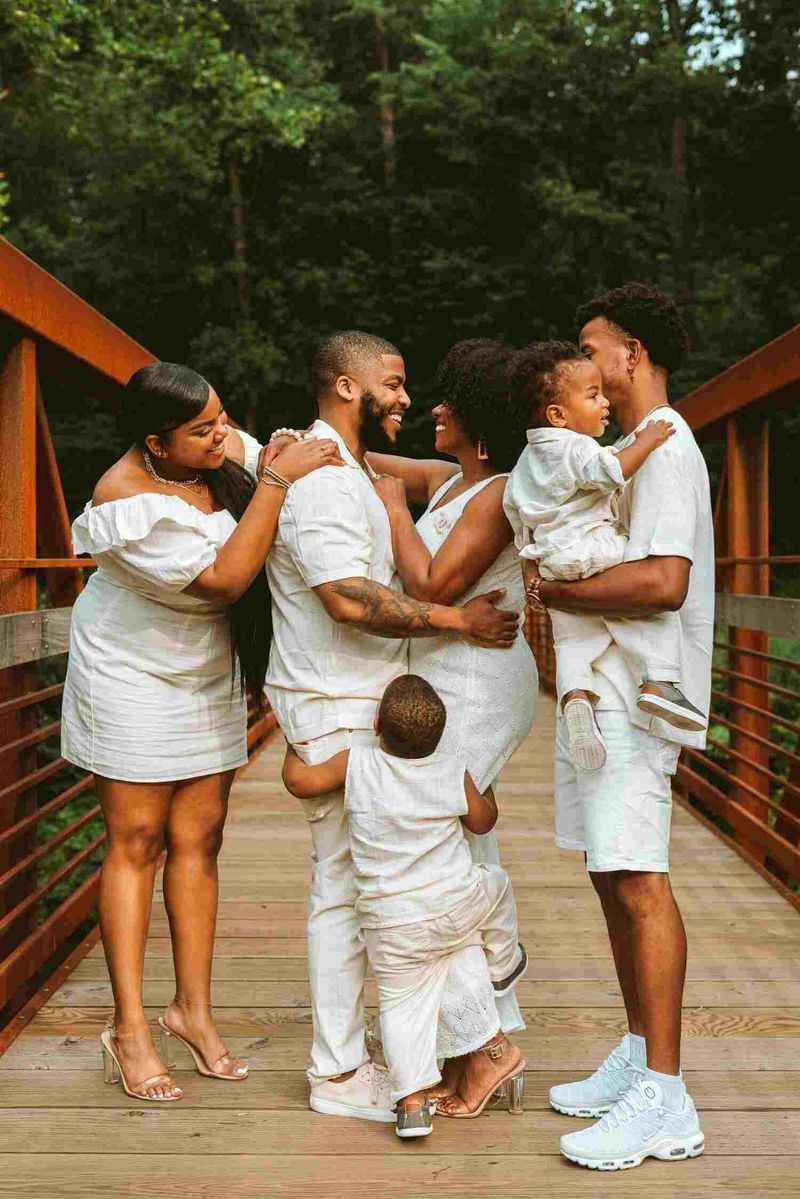20 Outdated Social Norms We Should Stop Following
Just because something’s always been done a certain way doesn’t mean it still makes sense. We often find ourselves trapped in the web of social norms that are outdated and no longer serve anyone.
Here are 20 social rules that need to be left behind, challenging us to question and redefine what we accept as ‘normal.’
1. You have to get married to be “settled.”

For many, the idea of being ‘settled’ has been traditionally tied to getting married. However, this notion is as antiquated as dial-up internet. People can be perfectly content and grounded without a ring on their finger. In our fast-paced world, personal satisfaction and stability can come from numerous sources, such as career achievements, friendships, or personal growth.
Embracing a life full of experiences, challenges, and triumphs can be just as fulfilling, if not more so, than the traditional path. Marriage is a choice, not a requirement, and it certainly doesn’t define completeness.
The societal pressure to tie the knot can lead to rushed decisions and even unhappiness. Let’s redefine ‘settled’ to mean being content with one’s life choices, regardless of marital status. Embrace a modern view, where happiness is measured by personal fulfillment, not relationship status.
2. Single doesn’t mean unfinished.

The myth that being single equates to being somehow incomplete is a narrative that needs unraveling. Singleness is often painted as a temporary phase, a waiting room before the ‘real’ life of partnership begins. But being single can be a rich and fulfilling lifestyle in its own right.
For many, it’s a conscious choice, one that allows focus on personal goals, hobbies, and independence. It’s about embracing oneself, rather than conforming to societal expectations. Whether climbing a mountain solo or enjoying a quiet day at home, singles have the freedom to explore life on their own terms.
In a world where independence is increasingly valued, it’s time to shed the outdated view that single means less. It’s about living boldly and authentically, celebrating one’s path, and recognizing that completion comes from within, not from a relationship status.
3. Men shouldn’t show emotion.

For too long, society has burdened men with the expectation to suppress their emotions. The stoic, emotionless male archetype is damaging, leading to mental health issues and strained relationships. Men are human, too, and experiencing the full range of emotions is a part of that humanity.
When men are allowed to express themselves freely, without judgment, it fosters healthier relationships and environments. It’s time to break the chains of toxic masculinity that dictate how men should behave. Vulnerability is not a weakness; it’s a strength.
Encouraging men to share their feelings openly not only benefits their well-being but also challenges outdated stereotypes that trap them in a cage of silence. It’s about creating a culture where empathy and understanding are valued, not stifled.
4. Women must take their husband’s last name.

The age-old tradition of women taking their husband’s last name is rooted in a history of ownership and patriarchy. While some still choose this path, it’s important to recognize it as a choice, not a mandate.
Modern relationships thrive on equality and mutual respect, allowing individuals to decide what best suits their identity. Whether a woman opts to keep her maiden name, hyphenate, or adopt her spouse’s surname, it’s a personal decision that should be respected.
This norm is not only outdated but also limits personal expression. Embracing individuality and the freedom to choose one’s identity is a step toward more equitable partnerships. It’s time to honor personal preference over tradition, celebrating the diversity of modern family names.
5. Success means owning a home.

The notion that success is synonymous with home ownership is a relic of past generations. For many, owning a home represents stability, but it’s not the only path to a fulfilled life.
Renting offers flexibility, allowing for life changes and mobility. It’s a lifestyle choice that can be just as rewarding. In today’s world, success is multifaceted and can include career achievements, travel experiences, or personal growth.
By redefining success, we open doors to diverse lifestyles and opportunities. Let’s celebrate the freedom to choose what success means individually, whether it involves a mortgage or not. It’s about finding joy and satisfaction in the life one crafts, regardless of property ownership.
6. You must have kids to be fulfilled.

The belief that parenthood is the ultimate fulfillment is deeply ingrained in society. However, a growing number of individuals are choosing child-free lives, finding satisfaction in various other endeavors.
Whether it’s pursuing a career, traveling, or dedicating time to hobbies and personal development, fulfillment comes in many forms. Parenthood is a rewarding choice for some, but it shouldn’t be seen as the default dream for all.
Life without children can be just as meaningful and enriching. It’s time to acknowledge and respect diverse paths to happiness. By embracing different life choices, we celebrate the richness of human experience beyond traditional roles.
7. Respect your elders no matter what.

The adage ‘respect your elders’ often implies blind deference, regardless of behavior. While respecting experience and wisdom is valuable, respect should be a mutual exchange.
Blindly following outdated ideas simply because they come from someone older is not productive. Encouraging open dialogue and understanding across generations fosters respect and growth.
Respect is not a one-way street. It’s about building relationships based on mutual admiration and understanding, regardless of age. By redefining respect as a two-way process, we can break down barriers and build a more inclusive society.
8. Don’t talk about money.

The taboo around discussing money keeps people in the dark about financial realities. Silence perpetuates economic inequality and prevents individuals from making informed decisions.
By talking openly about salaries, investments, and financial strategies, we empower each other to navigate the financial landscape more effectively. Transparency fosters trust and encourages more equitable economic opportunities.
Breaking the silence on money matters can lead to better financial literacy and independence. It’s time to normalize these conversations and dismantle the barriers that keep financial knowledge out of reach.
9. Your 20s should be the best years of your life.

The pressure to make your 20s the pinnacle of life is unrealistic. This decade is often filled with uncertainty, exploration, and learning.
Each life stage offers unique challenges and opportunities. The idea that your 20s should be the ‘best’ ignores the potential for growth and happiness at any age. Embracing the journey, with its ups and downs, is more rewarding than adhering to age-specific expectations.
Fulfillment can come from any phase of life. It’s about appreciating the moment and growth rather than comparing to societal benchmarks.
10. Mothers must be selfless at all times.

The notion that mothers must be endlessly selfless is not only unrealistic but also harmful. It perpetuates burnout and ignores the importance of self-care.
Mothers are allowed to prioritize their own needs alongside their family’s. Self-care isn’t selfish; it’s essential for maintaining mental and physical health. A well-nurtured mother is better equipped to nurture others.
Challenging this stereotype allows for healthier family dynamics and supports mothers in living balanced, fulfilling lives. Let’s redefine motherhood to include self-love and care.
11. You must forgive family no matter what.

The idea that family bonds necessitate unconditional forgiveness is limiting and can be damaging. Toxic relationships, even among family, can drain mental and emotional resources.
Forgiving someone doesn’t mean allowing toxic behavior to continue. Setting boundaries is a form of self-respect and protection. Family dynamics are complex, and sometimes the healthiest choice is to create distance.
By prioritizing mental health over obligatory forgiveness, we foster environments where genuine, positive relationships can thrive. It’s about recognizing the right to choose whom to keep in our lives, family or not.
12. Being busy means being successful.

The glorification of busyness as a marker of success overlooks the value of rest and leisure. Constant activity can lead to burnout and diminish quality of life.
Success is not solely defined by how busy you are but by how balanced and fulfilled you feel. Prioritizing downtime and relaxation is crucial for mental health and creativity.
Redefining success to include rest allows for a more sustainable and enjoyable lifestyle. It’s about finding harmony between activity and rest, achieving goals without sacrificing well-being.
13. Only women need to worry about aging.

The pressure on women to fight aging is immense, perpetuating the idea that youth is equivalent to value. This outdated norm ignores the fact that everyone ages, regardless of gender.
Embracing aging as a natural part of life allows people to focus on experience and wisdom rather than external appearance. It’s time to challenge beauty standards that discriminate based on age.
Celebrating aging as a collective human experience fosters acceptance and appreciation for life’s journey. Let’s value character and wisdom over superficial youthfulness.
14. Marriage equals maturity.

The assumption that marriage is a testament to maturity is a misconception. While marriage does bring responsibilities, maturity is about personal growth and life experiences.
Many find maturity through diverse paths, including education, career, and personal challenges. These experiences shape character and understanding of the world.
Maturity is not confined to marital status. It’s about navigating life with empathy, resilience, and insight, regardless of relationship status. Let’s redefine maturity to encompass individual journeys, not just milestones like marriage.
15. You must “bounce back” after childbirth.

The pressure to ‘bounce back’ physically after childbirth is immense and unnecessary. Each woman’s body changes and recovers in its own time.
The focus should shift from physical appearance to health and well-being. New mothers have enough to navigate without societal pressure to meet unrealistic standards.
Let’s celebrate the strength and resilience of mothers, honoring the natural journey of recovery. It’s about health, happiness, and embracing one’s unique path post-childbirth.
16. Don’t talk about politics or religion.

Avoiding discussions on politics and religion limits understanding and growth. These topics shape societies and personal beliefs, and engaging in respectful dialogue fosters enlightenment.
Silence can perpetuate ignorance and divisiveness. By encouraging open conversations, we promote empathy and informed perspectives. It’s essential to tackle challenging subjects with respect and curiosity.
Dialogue is crucial for progress and unity. It’s about listening, learning, and finding common ground in diversity.
17. Stay together “for the kids.”

The belief that staying together solely for the children’s sake often leads to unhealthy family environments. Children are perceptive and can be affected by parental discord.
Fostering a healthy environment is more important than maintaining a facade of unity. Sometimes, separation can provide the stability and peace children need to thrive.
It’s about prioritizing the well-being of all family members, recognizing that a loving environment doesn’t always require traditional structures.
18. You must respect tradition.

Blindly following traditions without questioning their relevance or fairness can hinder progress. Traditions should evolve with societal values and understanding.
While honoring heritage is important, it’s equally crucial to adapt and challenge practices that no longer serve a positive purpose. Progress requires reevaluation and growth.
Questioning tradition fosters inclusivity and innovation. It’s about honoring the past while building a future that reflects current values and knowledge.
19. You should be married by 30.

The arbitrary timeline dictating marriage by 30 is outdated and restrictive. Love doesn’t adhere to deadlines, and neither should we.
Life unfolds uniquely for each individual, and the pressure to meet this milestone can lead to unnecessary stress and poor decisions. Embracing one’s personal timeline allows for genuine connections and happiness.
It’s about living authentically and recognizing that love is timeless. Let’s redefine timelines to celebrate individual journeys and choices.
20. Private things shouldn’t be spoken out loud.

The belief that private matters should remain unspoken perpetuates shame and isolation. Speaking openly about personal issues can be liberating and healing.
By sharing experiences, individuals find support and understanding, dismantling stigma and building community. Openness fosters connection and empowerment.
Let’s challenge the notion that privacy equates to silence, and embrace the power of sharing stories. It’s about creating spaces for honesty and growth.







